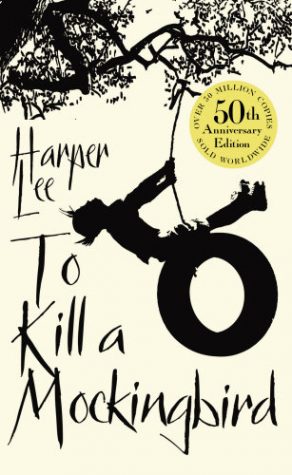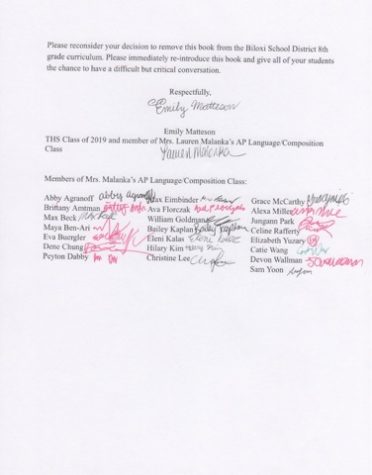The Power of the Pen
The school’s very own Emily Matteson uses her words to enact positive social change.
November 21, 2017
 When the Biloxi, Mississippi school district removed Harper Lee’s classic novel, To Kill a Mockingbird, from its eighth-grade curriculum, people across the country were outraged. The novel, due to the important messages it teaches about racism and the history of the American south, is often considered an essential read for students across the country.
When the Biloxi, Mississippi school district removed Harper Lee’s classic novel, To Kill a Mockingbird, from its eighth-grade curriculum, people across the country were outraged. The novel, due to the important messages it teaches about racism and the history of the American south, is often considered an essential read for students across the country.
The Biloxi school district, however, feels that the discomfort that To Kill a Mockingbird’s racist language provokes deems it inappropriate for eighth-grade students.
When Emily Matteson, a junior at Tenafly, heard Biloxi’s decision, she actively joined the nationwide protest. As a spirited, expressive individual, Matteson (’19) could not remain idle; she had to be apart of the change. So Matteson, aware of the might of the pen and the power of language, wrote a passionate, perceptive letter to the Biloxi school district, urging them to continue teaching Harper Lee’s Pulitzer Prize-winning novel.
“I needed to say something because this is our generation and they need to be able to have these difficult conversations that we’ve had,” Matteson said.
Matteson agrees with Biloxi that the racial slurs and derogatory language of To Kill a Mockingbird is uncomfortable, but she believes this discomfort teaches an invaluable lesson about our country’s relationship with racism.
“These derogatory and offensive words are powerful; they make people uncomfortable because they are painful to hear. However, it is critical that discrimination, offensive language, and racism are discussed in the classroom,” Matteson wrote. “We need a book like ‘To Kill A Mockingbird’ to illustrate the extreme prejudice that existed in our country’s past and to help start a conversation about the issues that sadly still exist today.”
Matteson’s compelling words resonated with her fellow AP Language and Composition students and teacher, prompting them to support Matteson’s mission and sign her letter. Ms. Malanka, Matteson’s English teacher, was especially moved by her student’s desire to enact social change. “It really made my year,” Malanka said, a proud smile on her face.
When the Biloxi school district received Matteson’s letter, among an abundance of other protests from activists across the country, Biloxi relented. The district agreed to give eighth-grade students the option of reading To Kill a Mockingbird, but only if their parents sign a permission slip confirming that their children can read and discuss the novel.
Matteson was disappointed that the Biloxi school district did not make the book required for eighth-graders because of how important a message it teaches. She was, however, incredibly excited to see positive social change in effect. “We can make a difference in the world,” Matteson said.
Ms. Malanka found Emily’s example to be reinvigorating, reminding the school of the power of protest. “If we think to ourselves that nothing will change than we are certain that nothing ever will change. So, we have to be willing to put ourselves out there and be vocal on issues that matter, not just for us but for other people.”


















































































































































